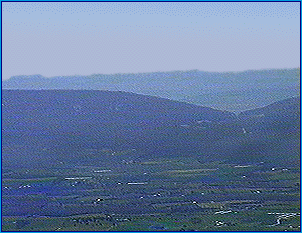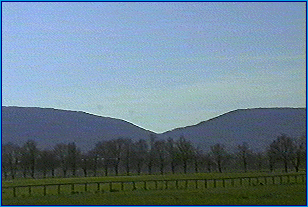"...this is a great
country and a beautiful one. I have never seen so
beautiful and apparently so fertile a valley."

New Market Gap seen from the
Blue Ridge Mountains
The Allenganies are in the background.
Williams' march was on between them and
Massanutten Mountain in which the gap lays
Banks' command pressed up the valley scattering the
opposition who made occasional stands behind rivers
forcing the Yankees to form lines of battle. The bridges
would then be burnt and the rebels would dissolve into
the countryside until they made their next stand.
Confidence soared and the illusion of success grew.
Williams' letters became jaunty, although the extended
lines and poor equipment began to cause him concern. To
their left, they passed New Market Pass, which, unknown
to them, would soon play a key role in leading them to
disaster and retreat...
"The day was beautifully spring-like, the finest
we have had, and what with the banging of big guns,
the long lines of troops and baggage wagons, it was
quite a day of excitement. Many of the shells of the
Rebels burst hundreds of feet in the air, giving the
semblance of pyrotechnics got up for our
entertainment. When, however, a piece from one of
them struck a poor fellow sitting quietly on some
railroad ties, splitting his skull and dashing his
brains in all directions, the poetry of the shelling
was changed to a sad realization of these
dangers."
A
brief skirmish at Stony Creek, left him in possession of
Edinsburg where he set up his headquarters in Jackson's
former headquarters at a place called Willow Glen
Cottage. An air of civility and normality reigned as
evinced in the following.
"The night after we arrived I went to call upon
the brigade commander and met the band of one of his
regiments coming to serenade me. I took them back to
Willow Glen and gave the young ladies the benefit of
the music. They were very pleasant and chatty but
rank Secessionists, having brothers and other friends
in the Rebel army. The scene from the house was
exceedingly beautiful. The troops had marched without
tents and one brigade had bivouacked from the road
far up the hillsides and built a very large number
(countless as seen from the piazza) of camp fires.
There was just enough of the new moon to make
"darkness visible" and to give a magical
effect to the whole scene. I don't know as I have
ever seen a sight more striking and impressive,
especially as the music of the band-the murmur of the
thousand voices from the bivouac and the occasional
cheer from the men as some patriotic air struck their
fancy, taken up and carried on away to the far off
ridges gave additional effect to the eye picture.
This, however, is the occasional poetry of war."

New Market Gap from the Valley
Pike
north of New Market, Virginia, April 1995
New Market fell and the march became almost leisurely, as
the spunky and resourceful rebels scattered before them.
Williams' affection for the beauty of the valley grew as
he proceded and wrote words that would draw me there 132
years later.
...this is a great country and a beautiful one. I
have never seen so beautiful and apparently so
fertile a valley. It improves greatly as we advance.
There were points on our march on Thursday that one
never tired looking at. We have still the same
mountain ranges on either hand, perhaps six miles
apart, and the same rolling valley between, but the
ridges are more broken into peaks and gaps and the
valley is occasionally traversed by spurs and dotted
by solitary peaks, which rise like sugar loaves from
an even surface.
This valley thus far continues to be beautiful-even
more so than farther "down," as they call
toward the north, more diversified and picturesque.
We have reached the end of the ridge that has hemmed
us in on the east, and now the valley spreads out in
that direction to the Blue Ridge, while the loftier
and irregular tops of the Alleghenies are plainly
visible on the west, stretching far away toward the
south. The intervening valley is broken into many
conical-shaped knobs, which give a most singular
appearance to the view as seen in the late afternoon
from a high hill east of town. The town is
beautifully situated in the bottom of the valley and
has around it many elegant country seats. It is
altogether the most attractive-looking town I have
seen in the valley.
His first observation about slaves occurred here and seem
to betray his political leanings. A war Democrat, he uses
his observations in a dig against abolitionists, who were
Republicans.
The Negro population increases as we go south, and
although they all understand that the rear is open to
them, very few leave their masters. Indeed, many of
them are afraid of us at first, probably from big
stories of our cruelties that are told them. They
seem glad at our coming and probably think some great
benefit is to accrue to them, but they show very
little desire to quit their present homes. In truth,
they are much attached to localities, and but for the
fear of being sold south I don't think a dozen could
be coaxed away. As it is, probably fifty have come in
and are employed by our quartermasters. If the
abolitionists could see things as they really are
here they would have less confidence in the aid the
Negro is in concluding this war. Their masters say
that they become more insolent and lazy on our
advance, and that is the only good we are likely to
do them...
Harrisonburg had fallen into their possession and the
southern foot of Massanutten was reached. Outnumbered
perhaps 4 to 1, Jackson's little army huddled near Swift
Run Gap of the Blue Ridge across the South Fork of the
Shenandoah, seemingly ready to give up the Valley to
Yankee juggernaut to join Johnston's Army about Richmond
which was contending with McClellan's army in the
Peninsula formed by the York and James Rivers. But,
troubling notes appear.
Our cavalry were sent forward toward Staunton a few
days since but found the bridges burned over the
streams below, which were not fordable just now.
Jackson's army is east of this from fifteen to twenty
miles on the slopes of the Blue Ridge. He has a very
large bridge between us and him. It is said that he
has it ready for burning. We fear he has been largely
reinforced and intends to turn upon us here or wait
for us in his present strong position...
I hardly know what will be the next movement. We are
now pretty well advanced into the interior and are a
long way from the base of our supplies. As we have
neither railroad nor water transportation we find it
no small task to keep our force supplied in rations,
forage, and clothing. I contrived to get shoes for
most of my division at the last camp, but our wants
are still many. The troops have had to bivouac much
of the time in rain and snow...
He was correct about Jackson's reinforcements, but no one
could have predicted the effect of the still small army
that was soon to march into legend...
  
|



